When it comes to adding new high-tech hardware to their vehicles, automakers are generating a mix of both praise and complaints, according to a new study by J.D. Power and Associates.
On the whole, new vehicle buyers have rated their 2015 models higher than ever, and Power’s 20th annual APEAL study gives a chunk of the credit to the latest safety technologies, such as blind-spot monitoring and forward collision warning systems. At the same time, motorists registered a number of complaints about faulty infotainment hardware and balky voice recognition systems.
With rare exception, automakers saw their APEAL scores improve this year, the overall average rising to 798 points out of a possible 1,000. But the Korean makers collectively posted the biggest improvements, while the Japanese lagged behind the industry on the whole.
That echoes the findings of the J.D. Power Initial Quality Study released a month ago. It found the Korean carmakers posting the biggest overall improvement, with Kia ranked second and Hyundai fourth among 33 brands in terms of the lack of “problems” during the first 90 days of ownership.
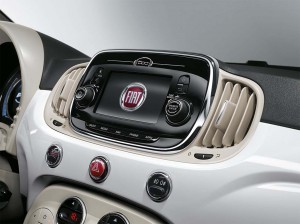
The Uconnect system, shown here in a Fiat 500, was rare among infotainment systems getting good reviews from owners.
(Japanese makers slide, Koreans surge in latest JD Power IQS. Click Here for more.)
The IQS is a classic “Things-Gone-Wrong” study. Power researchers put more of a focus on “Things-Gone-Right” with the APEAL survey, short for Automotive Performance, Execution and Layout. It asks owners to evaluate their vehicles across 77 different attributes, ranging from design to performance, fuel economy to advanced technology.
Overall, Porsche ranked at the top of the list – as it did in the 2015 IQS, followed by Jaguar, BMW, Mercedes and Audi. Among non-premium brands, Mini came in tops.
Not surprisingly, luxury makers traditionally outscore their mainstream rivals, reflecting their added features, among other things. But the gap between luxury and non-luxury marques narrowed significantly, according to Power Vice President Renee Stephens, to the lowest point in a decade. The average premium score was 841 out of a possible 1,000, while it rose to 790 among non-premium brands.
Korean automakers gained an average seven points in the 2015 APEAL study, while Europeans and Detroit brands were each up six points. The Japanese, with just a two-point improvement, lagged well behind. Japanese makers, on the whole, also slipped in the Initial Quality Study.
(Korean brands score big again in vehicle satisfaction awards. For more, Click Here.)
Among individual brands, Volvo scored the biggest improvement among premium brands while Mini had the biggest gain in the non-premium category – and among automakers overall, rising 30 points this year. That was largely due to the positive reception it received for the newly redesigned Mini Cooper model.
As for the 26 individual vehicle segments, Mercedes-Benz not only lead in the Large Premium Car category but had the single-highest rating of any vehicle. Chevrolet, Ford and Porsche each led in three categories, Audi, BMW, Dodge, Mazda and Mini in two segments.
While all-new or completely redesigned vehicles often slip in the Power IQS study because of start-up production problems, these new models generally led the industry in Power’s APEAL, in part due to the rapid pace in which manufacturers are adding new features, improving performance and boosting fuel economy, according to Power officials.
Owners rated their 2015 vehicles higher in virtually every category this time, and one reason was the increasing proliferation of high-tech safety systems, noted Stephens. “Those who had blind spot warning tended to rate their vehicles more highly,” she explained, adding that this technology was found on 36% of the vehicles the study covered.
But while advanced safety technology scored well, owners registered disappointment in their infotainment systems. They pointed to voice recognition systems that were balky, malfunctioning navigation technology and touch screens that didn’t work right, as well as the confusion they faced in operating those systems.
A rare exception was Fiat Chrysler whose Uconnect system received generally favorable reviews, according to Stephens.
(Fiat Chrysler takes the brass ring in the latest Total Quality Index. Click Here to find out why.)
There is an ongoing debate over how to measure quality, especially as even the worst brands have made major improvements in recent years. In the Power IQS, for example, as many as half of the owners surveyed experienced no “problems” during their first 90 days of ownership. That has led to more of a focus on things-gone-right surveys, like APEAL.
And, indeed, Stephens noted, “This study has one of the highest correlations to an owner’s likelihood to recommend a vehicle,” as well as the likelihood that an owner will return to that same model or brand the next time they trade in.

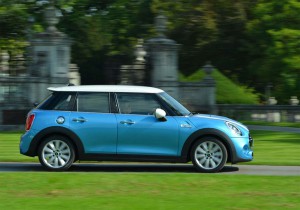
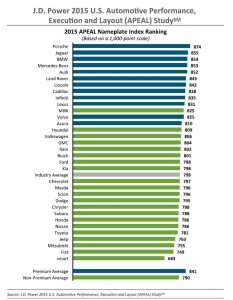
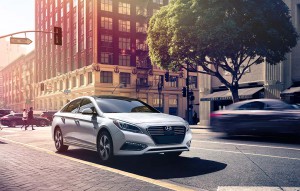
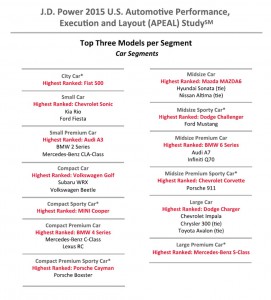

A recent survey showed that woman are more swayed by so called safety devices in newer cars, then men. Evidently woman assume that these devices all function properly and will protect them in the event of an accident. There is no doubt that some safety features do work well but some are more gimmick than savior IMO. Eliminating ALL driver distractions is likely to be far better at reducing accidents than passive safety devices intended to reduce injury.